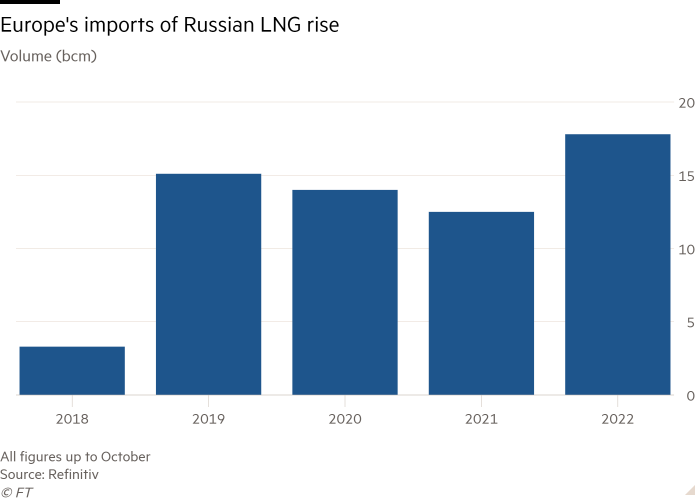[ad_1]
Europe is importing a file quantity of seaborne Russian fuel, highlighting how the area has not fully shaken off its dependence on the nation for the important thing gas at the same time as flows by way of pipelines have all however stopped.
Imports of Russian liquefied pure fuel, which is often transported on huge tankers, rose greater than 40 per cent between January and October this yr, in contrast with the identical interval in 2021, highlighting the problem for Europe in weaning itself off fuel from Moscow regardless of Brussels’ makes an attempt to shift away from Russian sources.
Russian LNG made up 16 per cent of European seaborne imports throughout the interval. Whereas the whole quantity of 17.8 billion cubic metres represented a fraction of the 62.1 bcm pipeline fuel flows throughout this time, it however leaves Europe uncovered to Vladimir Putin’s weaponisation of power.
“Sooner or later, Putin might get up and say, ‘we’ll cease sending LNG to Europe’, forcing the area to purchase from an much more costly spot market,” stated Anne-Sophie Corbeau, international analysis scholar on the Heart on World Vitality Coverage at Columbia College.
Russia might additionally divert the cargoes to LNG-starved international locations resembling Bangladesh and Pakistan at low-cost costs to “obtain political beneficial properties” and “put strain on Europeans”, she added. “It’s crucial to not neglect that quite a lot of international locations are struggling, as a result of they can’t afford LNG.”

There aren’t any sanctions on Russian fuel, owing to its significance to some European nations’ power safety. The Kremlin has taken benefit by steadily decreasing the movement by way of pipelines after the invasion of Ukraine, boosting costs and fuelling a value of residing disaster throughout the continent.
Gasoline flows by way of the Yamal pipeline, which runs by way of Poland, have been halted since Could, and Russia minimize flows by way of the Nord Stream 1 line to Germany in the summertime. The pipeline later ruptured, in what some European international locations alleged was a deliberate act of sabotage.
Russia has additionally just lately threatened to limit provides to western Europe by way of the one pipeline nonetheless connecting the area by way of Ukraine. Pipeline fuel from Russia is sort of 80 per cent down in contrast with the identical interval final yr, in accordance with information from think-tank Bruegel.
So as to fill the hole, Europe, which final yr imported 155 bcm of Russian pure fuel, together with LNG, has turned to the worldwide LNG market. It imported a file 111 bcm price of LNG globally between January and October, information from Refinitiv confirmed, a rise of almost 70 per cent yr on yr.
Imports from Russia throughout the interval amounted to 17.8 bcm, rising 42 per cent in contrast with the identical interval in 2021, with France, Belgium, Spain and the Netherlands taking over nearly all of the volumes.
Most Russian LNG comes from the Yamal LNG three way partnership, which is majority owned by the Russian firm Novatek, with different stakes held by France’s Whole, China’s CNPC and a Chinese language state fund. Barely lower than 10 per cent of Novatek shares are owned by Russia’s state-owned Gazprom.
In one other signal of Europe’s ties with Russia, a big ship carrying LNG from the Portovaya facility close to Russia’s southern border with Finland arrived in Greece final month, in accordance to satellite tv for pc information analytics firm QuantCube. This may mark the primary cargo by the Portovaya venture, which started working earlier this yr.
Since 2017, the nation has been a top-three supply for Europe, accounting for about 20 per cent of its complete imports up to now three years. Russia has been the second-largest supply this yr, in accordance with Refinitiv, however its share has dipped to 16 per cent regardless of the file imports as Europe has taken in additional US LNG, which accounted for 42 per cent. Qatar was the third-largest LNG provider to Europe, accounting for 13.7 per cent.
“My considerably cynical take is that if we purchase LNG from Russia, that’s OK. As a result of we’re getting from the Russians what would in any other case have been despatched [somewhere else],” stated Georg Zachmann, senior fellow at Bruegel. “What Europe urgently wants is a mechanism to guard in opposition to the occasion that Russia selectively sends fuel to particular person consumers in Europe with a view to purchase political advantages” and disrupt Europe’s unity, he added.
European solidarity is already being examined with a rift growing between international locations resembling Spain and Greece in favour of a cap on fuel costs, whereas Germany, Denmark and Netherlands have remained sceptical of such a transfer. Hungary, in the meantime, signed a brand new fuel take care of Gazprom in August.
If the solidarity breaks, “then we’d run the chance that extra international locations than simply Hungary could be very prepared to just accept Russian fuel simply and that might be an enormous situation”, Zachmann stated.
[ad_2]
Source_link












